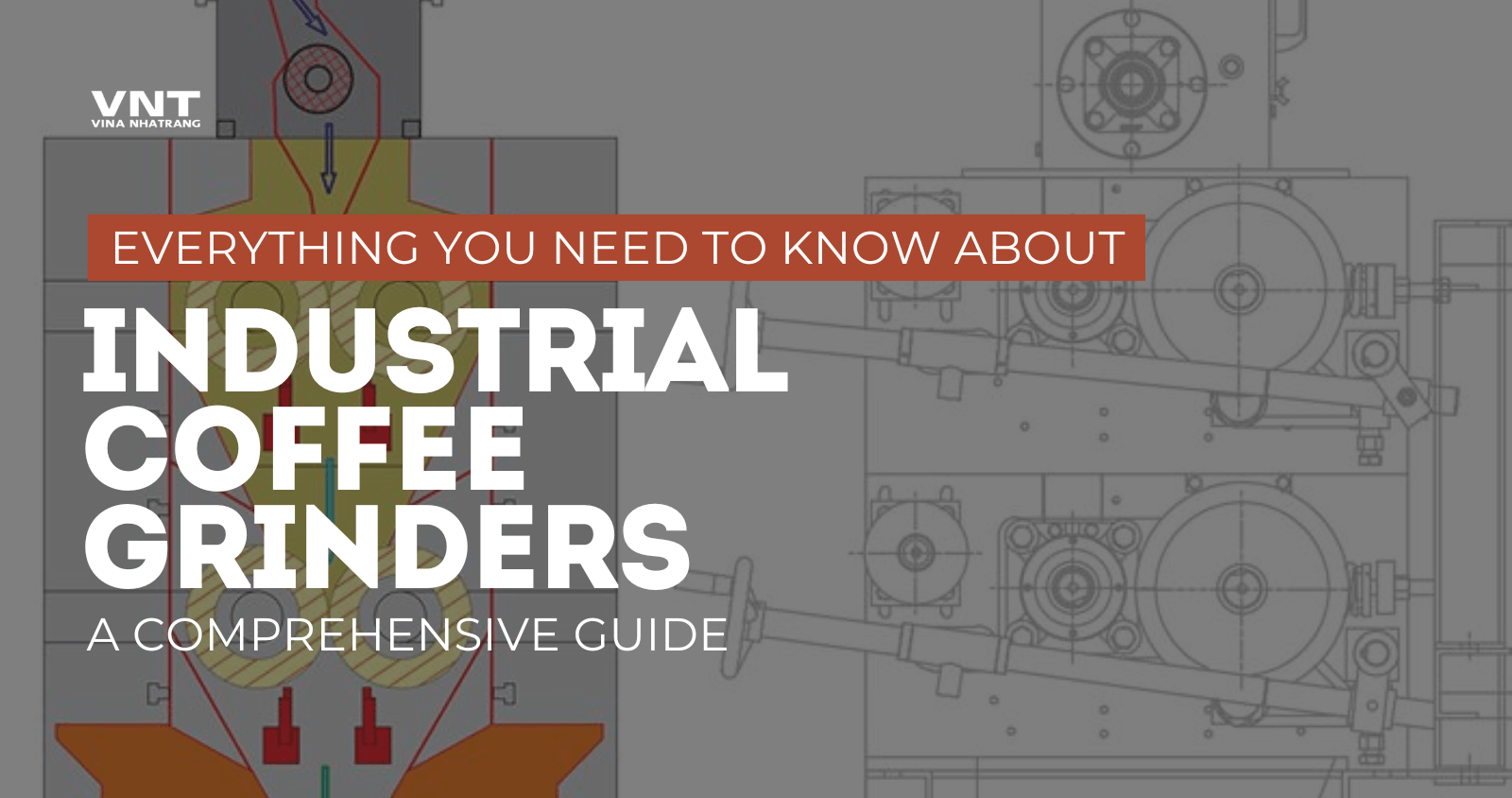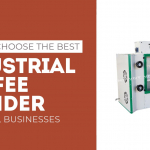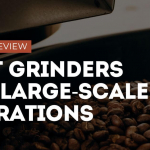In the bustling coffee industry, the role of industrial coffee grinders cannot be overstated. They are the unsung heroes behind the rich, aromatic, and flavorful coffee we enjoy daily. From the humble coffee shop to the grand coffee roasteries, grinders are the backbone that ensures the perfect blend of coffee beans and water. This blog post aims to shed light on the importance of industrial coffee grinders, their types, and how to choose the right one for your business.
Understanding the Need for Industrial Coffee Grinders
Industrial coffee grinders play a pivotal role in the coffee industry, extending far beyond the realm of home enthusiasts or small-scale coffee shops. These grinders are indispensable for businesses involved in roasting and selling coffee, whether it’s for their own use or as suppliers to others. The design of industrial coffee grinders is specifically tailored to manage large volumes of coffee, ensuring that businesses can efficiently and consistently meet the demands of their customers.
The necessity of industrial coffee grinders is rooted in the fundamental process of coffee brewing. Grinders are essential for transforming whole coffee beans into smaller grounds, a crucial step that facilitates the extraction of coffee flavors. This process is vital because whole beans are denser, making it challenging for water to penetrate them. However, when the beans are ground, water can more easily pass through the particles, extracting the flavors of coffee along the way. Without a grinder, this essential step in the coffee-making process is skipped, leading to a less flavorful coffee experience.
Moreover, grinding coffee beans before brewing ensures that each cup of coffee is fresh and flavorful. Experienced coffee enthusiasts agree that freshly ground coffee surpasses pre-ground coffee in terms of taste and aroma. Therefore, choosing a quality industrial grinder that aligns with the specific needs of your business is crucial to delivering exceptional coffee to your customers.
In essence, industrial coffee grinders are not just tools for coffee enthusiasts; they are critical components of the coffee industry, enabling businesses to provide high-quality coffee consistently. Whether you’re a small coffee shop or a large-scale roaster, investing in a industrial coffee grinder is a smart move that can significantly enhance your coffee offerings and customer satisfaction.
The Impact of Grinder Quality on Coffee Flavor and Consistency
A high-quality industrial coffee grinder is crucial for producing evenly sized coffee particles, which allows for consistent brewing and brings out the best flavors in the beans. The material of the grinding disc is particularly important. Steel is the preferred choice due to its durability and ability to withstand the rigors of grinding.
Explore our in-depth guide on How Industrial Coffee Grinder Impact Coffee Flavor and Consistency
Die-cast steel discs are known for strength and durability, making them ideal for heavy-duty grinding tasks and achieving a finer grind consistency. Tungsten carbide discs, on the other hand, are highly resistant to wear and tear, suitable for businesses that grind large volumes of coffee daily.
Choosing the right grinding disc material directly affects grinding performance and grind size uniformity. Die-cast steel can grind more efficiently, while tungsten carbide ensures longevity. Ultimately, a high-quality grinding disc enables businesses to grind coffee to perfection, maximizing the flavor potential of their beans.
Types of Industrial Coffee Grinders
Industrial coffee grinders come in a variety of types, each with its own set of features and functions, catering to different needs and preferences in the coffee industry. Here’s a breakdown of the different types:
- Burr Grinders: These are the most popular type of grinder, known for their ability to produce a fine grind. They use a series of burrs to crush the coffee beans, ensuring a uniform size that’s ideal for brewing. This uniformity is crucial for achieving a consistent flavor profile in your coffee.
- Flat Burr Grinders: These grinders are designed with flat burrs, which create a more consistent grind texture. This consistency is excellent for highlighting the chocolatey and nutty undertones in coffee, making it a favorite among coffee enthusiasts who appreciate these flavors.
- Conical Burr Grinders: Conical burr grinders offer a balance between fine and coarse grinds. They use conical burrs, which grind the coffee beans into flakes. This method is particularly effective for extracting all the aromas from the beans, providing a unique texture that some coffee lovers find appealing.
- Doser Grinders: These grinders come with a dosing mechanism, allowing for precise control over the grind size and quantity. This feature is particularly useful in commercial settings where consistency and control are key.
- Doserless Grinders: Unlike doser grinders, doserless grinders do not have a dosing mechanism. This makes them simpler and more straightforward to use, which can be a benefit for those who prefer a more hands-on approach to grinding coffee.
- Stepless Grinders: Stepless grinders offer a continuous range of grind sizes without the need for manual adjustments. This feature provides a high level of flexibility, allowing users to fine-tune their grind size to their exact preference.
Explore our in-depth guide on Types of Industrial Coffee Grinders
Each type of grinder has its unique features and functions, making them suitable for different coffee-making needs. Whether you’re looking for a fine grind for espresso, a consistent texture for drip coffee, or the flexibility to adjust your grind size, there’s a grinder type that can meet your requirements.
Critical Features of a Top-Notch Industrial Coffee Grinder
When selecting a industrial coffee grinder, it’s important to consider several key features to ensure it meets your business’s needs effectively. Here’s a more detailed look at what to consider:
- Speed: The grinder should be capable of processing a large volume of coffee beans in a short amount of time. This is crucial for businesses that serve a high volume of coffee, as it helps to keep the coffee shop or café running smoothly without delays.
- Quantity: The size of the grinder’s hopper and the output capacity are vital considerations. These features determine how much coffee the grinder can handle at once. For businesses with high coffee sales, a grinder with a larger capacity can significantly reduce the time spent on grinding and brewing.
- Quality: It’s essential to choose a grinder made from high-quality materials, such as steel or ceramic. These materials are durable and can withstand the rigors of grinding coffee beans day in and day out. Look for grinders that are designed for longevity and efficiency, ensuring they can handle the demands of your business without breaking down.
- Business Type and Layout: The size of your business and the layout of your space should also influence your choice of grinder. For smaller establishments, a compact grinder might be more suitable, while larger businesses might need a grinder that can handle more volume and possibly be placed in a more central location for easy access.
- Ease of Use: Consider how easy the grinder is to use. Some grinders might have a simple, straightforward operation, while others might offer more advanced features. Choose a grinder that fits well with your staff’s skill level and the workflow of your business.
- Maintenance and Support: Look for a grinder that comes with good warranty and support options. This ensures that if something goes wrong, you can get it fixed or replaced quickly. Additionally, consider the ease of cleaning and maintenance, as this can affect the grinder’s lifespan and the quality of the coffee it produces.
By carefully considering these factors, you can select a industrial coffee grinder that not only meets your business’s needs but also contributes to the overall quality and efficiency of your coffee-making process.
Conclusion
Choosing the right industrial coffee grinder is a critical decision for any business in the coffee industry. By understanding the importance of grinders, the types available, and the key features to look for, you can select a grinder that meets your business needs and ensures the quality of your coffee. Remember, the right grinder can kickstart the growth of your roasting empire, so choose wisely.





